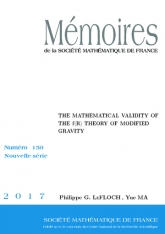Validité mathématique de la théorie $f(R)$ de la gravité modifiée
The Mathematical Validity of the $\mathbf {f(R)}$ Theory of Modified Gravity

- Consulter un extrait
- Année : 2017
- Tome : 150
- Format : Électronique, Papier
- Langue de l'ouvrage :
Anglais - Class. Math. : 83C05, 35L15, 83C99
- Nb. de pages : vi + 119
- ISBN : 978-2-85629-849-7
- ISSN : 0240-633-X (print) 2275-3230 (electronic)
- DOI : 10.24033/msmf.458
Nous étudions le problème de Cauchy pour la théorie $f(R)$ de la gravité modifiée, laquelle généralise la théorie ique de gravitation due à Einstein. L'intégrant de la fonctionnelle d'Einstein-Hilbert est la courbure scalaire de l'espace-temps, tandis que, dans la théorie de la gravité modifiée, l'intégrant est une fonction non linéaire $f(R)$, et les équations de champ sont d'ordre quatre par rapport aux dérivées de la métrique inconnue. Nous introduisons ici une formulation du problème de valeurs initiales pour la gravité modifiée, lorsque des données sont prescrites sur une hypersurface de type espace. Nous établissons que, en plus de la métrique induite et de la deuxième forme fondamentale, il est nécessaire de se donner la courbure de l'espace-temps et sa dérivée première. Nous proposons alors une formulation conforme « augmentée » dans laquelle la courbure scalaire est une inconnue indépendante supplémentaire. Dans la jauge des ondes (ou jauge harmonique), nous démontrons que les équations de champ forment un système couplé non linéaire d'équations d'ondes et d'équations de Klein-Gordon. Nous établissons une propriété de consistance pour ce système dont les inconnues sont la métrique conforme et la courbure scalaire, et nous démontrons l'existence d'un développement de Cauchy maximal lorsque les données initiales ont une régularité de type Sobolev et que la matière est décrite par un champ scalaire sans masse. Nous analysons le « couplage de Jordan » dans la métrique d'Einstein qui est conformément équivalente à la métrique physique. Nous obtenons des estimées de type énergie dans des espaces fonctionnels à poids ; ces estimées sont uniformes par rapport à la nonlinéarité $f(R)$ et nous permettent de valider rigoureusement la limite singulière $f(R) \to R$. Nous montrons ainsi que le système d'ordre quatre de la gravité modifiée converge vers le système d'ordre 2 de la gravité d'Einstein. Ce travail établit donc la validité mathématique de la théorie de la gravité modifiée.

